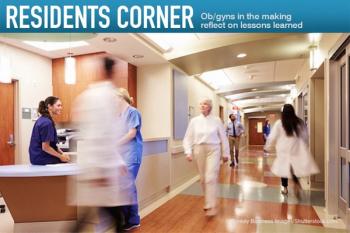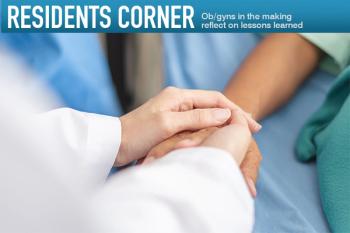
- Vol. 64 No 04
- Volume 64
- Issue 04
Mistakes
Residency growing pains should eventually lead to confidence, but sometimes they just result in more growing pains.
When I first became a physician, I felt like I was lying to patients I saw in clinic. I would introduce myself as their doctor, but as I waited for my clinical knowledge to catch up to my new title, I realized I barely knew the basics. I barely knew where the bathrooms were.
Every day I danced carefully around the questions I knew I could answer and the ones I would have to defer awkwardly to a more senior physician. In the latter cases, when I would stumble clumsily, the patient’s eyes would invariably flick toward my ID badge just long enough to make sure she really saw an “MD” after my name.
Now, after almost a year as a physician, there are some days when I can manage to convince everybody, even myself, that I am competent. While the big things need to be run by my attendings, there are a thousand small decisions I make every day on my own. How much Tylenol should I send this patient home with? Does this lady’s postoperative pain warrant another oxycodone? Do I have time to wolf down a lunch before I go to this consult in the ED? I never had a lecture on these questions in medical school. I can’t run every single one of these problems by one of the higher-ups. I have to learn to find answers on my own, to rely on my developing medical intuition and some common sense. With every tiny decision, and every patient who leaves my care unscathed, I develop a little more confidence.
But I still make mistakes all the time. A few months ago, I spent a day in the outpatient surgery center, running my own OR. I did five cases in a row with a single attending, who was quite kind as I slowly prepared each patient for the case. When it was time to make our first incision, she handed me the scalpel and gestured for me to go ahead. But when it came time to place the Veress needle, she gently took the instrument from my hands. A resident had once pushed too far in one of his operations, she said, puncturing the aorta and nearly killing the patient on the operating table. Since then, this attending inserted every Veress herself.
The day progressed, and after a few surgeries together, the attending began to trust me more and more. We were laughing with the scrub nurses, bonding over a shared taste in the music that was blasting from the OR speakers. I began to anticipate the attending’s requests before she made them, learning exactly how to turn the camera or my wrist to give her the angle she needed on a tricky cut. In the last case of the day, with the patient draped and prepped, she handed me the Veress needle, saying quietly, “It’s been a long time since I’ve let a resident do one of these. Don’t mess it up.”
I took a deep breath, acknowledging the gravity of this decision. I grasped the needle and drove it slowly through the layers of fascia, hearing the satisfying double pop that told me we were in the right place. The gas flowed in easily and a quick scan with the camera inserted moments later showed no damage. The attending smiled and we turned the OR music up a little bit.
Near the end of the case, the attending moved away from the table to check on some of the instruments, leaving me to sew shut the three incision sites we had left on the patient’s abdomen: two on each side and one in the umbilicus. We let the anesthesia team know we were ready for the patient to start waking up and began removing the various drapes from the operation. As I was clearing up, I suddenly heard the attending shout out. She looked up at me in horror. “You didn’t close one of the incision sites.”
And then I realized what had happened. In every laparoscopic case I had done so far, the attending physician had been the one to sew shut the tricky umbilical incision. Growing more and more confident, I had overlooked this task, completely forgetting to do what I had been asked. I had been about to send this patient back to the recovery room with a 10-mm hole in her umbilicus, leading directly into her abdominal cavity.
I was dumbstruck. Before I could even grab a needle and thread, the attending silently sewed the incision herself. I felt mortified. How could I make such a simple, potentially dangerous mistake? I imagined the attending telling future trainees, “I never let residents close the umbilical incision. One time one of them nearly sent a patient home with a hole in her belly…”
Since that surgery, I have made dozens of mistakes, and probably hundreds that I will never know about. But of course, now is the time for me to be making them. Residency is a constant cycle of hubris and humiliation. I am surrounded by patient educators and educators with patience. As I navigate the space between the emotional peaks and troughs, I do my best to focus on the senior residents and attendings around me who I respect the most. If they can all survive this constant assault on the ego and come out the other side as knowledgeable, humanistic, confident physicians, there’s a chance I may be able to also.
Articles in this issue
almost 7 years ago
Chronic vulvar lesions in a woman in her 30salmost 7 years ago
Endometrial polyps: In-office managementalmost 7 years ago
What’s new in biomarker testing for ovarian canceralmost 7 years ago
Patients not always truthful when dealing with cliniciansalmost 7 years ago
Sepsis during pregnancy and the puerperiumalmost 7 years ago
When a routine prenatal visit is not-so-‘routine’almost 7 years ago
Contemporary OB/GYN contributors at ACOGalmost 7 years ago
What is pediatric and adolescent gynecology?almost 7 years ago
Help HIV-positive women reach reproductive goalsNewsletter
Get the latest clinical updates, case studies, and expert commentary in obstetric and gynecologic care. Sign up now to stay informed.









